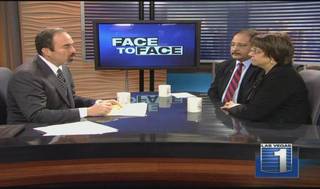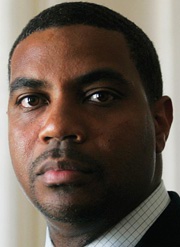Sunday, March 15, 2009 | 2 a.m.
Sun Archives
- Teachers union blasts Horsford on education (3-13-2009)
- Gibbons counts on tax increase, but won't sign it (3-11-2009)
- Room tax hike: Sun's winners and losers (3-11-2009)
- Senate passes hotel room tax hike (3-10-2009)
- State Senate delays vote on room taxes (3-9-2009)
- Nevada Assembly OKs bill to raise room tax (2-24-2009)
Boxed In?

Viewing video requires the latest version of Adobe's Flash Player
State Senate Majority Leader Steven Horsford will propose a sweeping overhaul of Nevada’s education system this week, with reforms that offer a sharp critique of the state’s education establishment, including the Board of Education, the superintendent of public instruction and the teachers union.
“The pattern is clear,” the Las Vegas Democrat said in an interview Friday. “The students are smart enough, but our schools are letting them down, and we’re falling behind the rest of the nation.”
The plan strikes at the foundation of Nevada education, taking on entrenched interests and bureaucracy, and though he would give starting teachers a pay raise, the 30,000-member teachers union is clearly in his sights.
But the proposal is also unsurprising given Horsford’s background. He has pushed for education reform since well before his election to the upper chamber in 2004, and his wife is a postdoctoral fellow in the education department at UNLV.
Horsford’s proposals include an overhaul of the state education apparatus and the way the State Board and superintendent are chosen, as well as performance pay for teachers coupled with tough accountability standards.
Aspects of the plan will likely draw Republican supporters, who have raised some of the same ideas. It also could face opposition from lawmakers, particularly in his own party, influenced in particular by concerns of the teachers union.
Assembly Speaker Barbara Buckley, D-Las Vegas, has also made education reform a priority, so some legislation seems likely.
One obvious problem: How to pay for the merit raises and the increase for starting teachers when the state faces a $2.36 billion shortfall. Horsford said he would pay for these proposals with changes to the retirement benefits of new employees, but it’s not clear how much money that would save.
Horsford is clearly working off recent data showing that teacher quality is the most important predictor of student achievement, with the best instructors teaching a year and a half of material in a school year, and the worst just a half-year.
“Teachers deserve to be paid more but they should be held accountable for improved results,” he said.
New teacher salaries average about $33,000 in Nevada. Horsford has proposed increasing that to $40,000.
A pay-for-performance system would reward the best teachers, with half the awards determined by quantitatively measured academic achievement of students, and the other half by more subjective measures, such as principal recommendations, parent surveys and participation in professional training.
Although nothing in his proposal would reduce barriers to firing bad teachers, when Horsford was asked if he would support such a measure, he replied, “That should be on the table. We cannot allow bad teachers or those not committed to improving our chances of success” to stand in the way.
Some of these proposals will meet resistance from the teachers union. Last week, union President Lynn Warne questioned Horsford’s commitment to the state’s schoolchildren.
Warne said she hadn’t yet seen the proposed changes and new initiatives.
“I’m disappointed Sen. Horsford chose not to share those details with us beforehand, but that’s his prerogative,” Warne told the Sun, adding that she would work with him.
She said the union would support pay-for-performance, at least in principle.
The education bureaucracy is in for an overhaul if the Horsford proposal passes.
“We need to change the process for selecting education leadership,” he said.
Horsford would change the makeup of the elected, 10-member State Board by reducing it to six, with three elected and three appointed by the governor and legislators.
The State Board has had a history of unopposed incumbents and difficulty filling vacancies. Members often have little or no experience supervising staff, overseeing budgets or shaping public policy.
Horsford wants the governor and Legislature to play a bigger role in the selection of the superintendent of public instruction. In the Horsford plan, the State Board would offer three names to the governor, who would make the selection, though the choice would be subject to confirmation by the state Senate, every two years.
A responsibility of the superintendent, no matter who it is, Horsford said, would be cleaning up the flawed System of Accountability Information in Nevada, a statewide database that traces individual student achievement so the state can comply with the federal No Child Left Behind law.
Horsford said policymakers are too often flying blind, without adequate information as to which students are achieving and which aren’t.
He also wants better coordination between the Nevada System of Higher Education and the K-12 system. The university regents would be allowed to appoint an ex-officio member of the state board, and the universities would have formal partnerships with schools to ensure they are preparing students for college.
Throughout the interview, Horsford offered a brutal assessment of the state of Nevada schools, citing abysmal graduation rates and Iowa standardized test scores in which Nevada fourth graders perform slightly above national averages, only to fall below average in seventh grade and well below average in 10th grade.
“Who should be held accountable for those poor results?” he said. “The Nevada Department of Education, and our role in the Legislature is to hold them accountable for better results.”
Indeed, the Horsford plan would create a commission, drawn from appointments by the Legislature and the governor, to oversee the reforms and report to the 2011 Legislature, all but placing the state Education Department in a state of receivership.
The state’s education establishment viewed the proposals with some skepticism.
John Hawk, who served four years on the State Board of Education before stepping down to open a charter school, said he opposed making the position an appointed office. “The process as it is now gives the power to the public,” said Hawk, who is executive director of Nevada State High School.
The proposed overhaul of the Nevada Education Department struck some as a no-confidence vote in Keith Rheault, the state’s superintendent of public instruction. The State Board hired Rheault in 2004, after he spent 18 years with the department.
“Blaming all of the ills of the world on Keith Rheault” is a mistake, said Joyce Haldeman, associate superintendent for community and government relations of the Clark County School District.
“He does his job and he does it well,” said Haldeman, who had not seen the proposed legislation. “The biggest problem at the Nevada Education Department is a lack of personnel to get things done. I understand the frustration these lawmakers have, because they ask for data and don’t get it quickly. But if the office were fully staffed, there would be few complaints.”
For Clark County Schools Superintendent Walt Rulffes, the central issue is whether the Nevada Education Department has the resources it needs to fully support districts.
“Any reform has to address the practical, day-to-day issues,” Rulffes said.
As for the merit pay proposal, Rulffes noted that Clark County is showing success with a version in its empowerment schools pilot program. Educators share a fresh appetite for discussing different models, Rulffes said.
More complicated is the proposed mandate to increase pay for new teachers. Districts are bound by negotiated agreements when it comes to salaries, and that makes it tricky to reset the bottom of the pay scale, Rulffes said. Problems could arise if first-year teachers are suddenly making more than their colleagues with three, four or even five years experience.
Rheault pointed to his department’s improvement plan already in place, as required by the federal No Child Left Behind Act. Under the federal education law, every school, district and state education department must annually review its progress, and produce a blueprint for fixing shortfalls.
“If there are additional things that some lawmakers want to see considered as part of that plan, we would certainly take a look at that,” Rheault said.
The statewide student-achievement database that has been in place since 1995 has undergone several major expansions and revisions. Nevada recently received a $7 million federal grant to expand the system’s scope, a project that won’t be finished until early 2010, Rheault said.


Join the Discussion:
Check this out for a full explanation of our conversion to the LiveFyre commenting system and instructions on how to sign up for an account.
Full comments policy